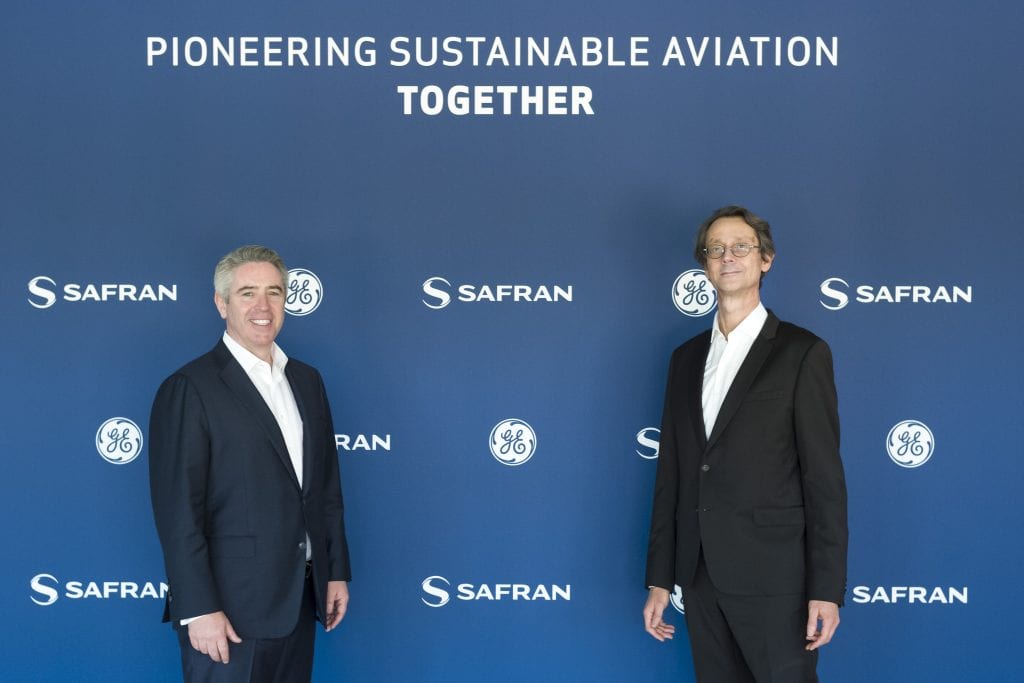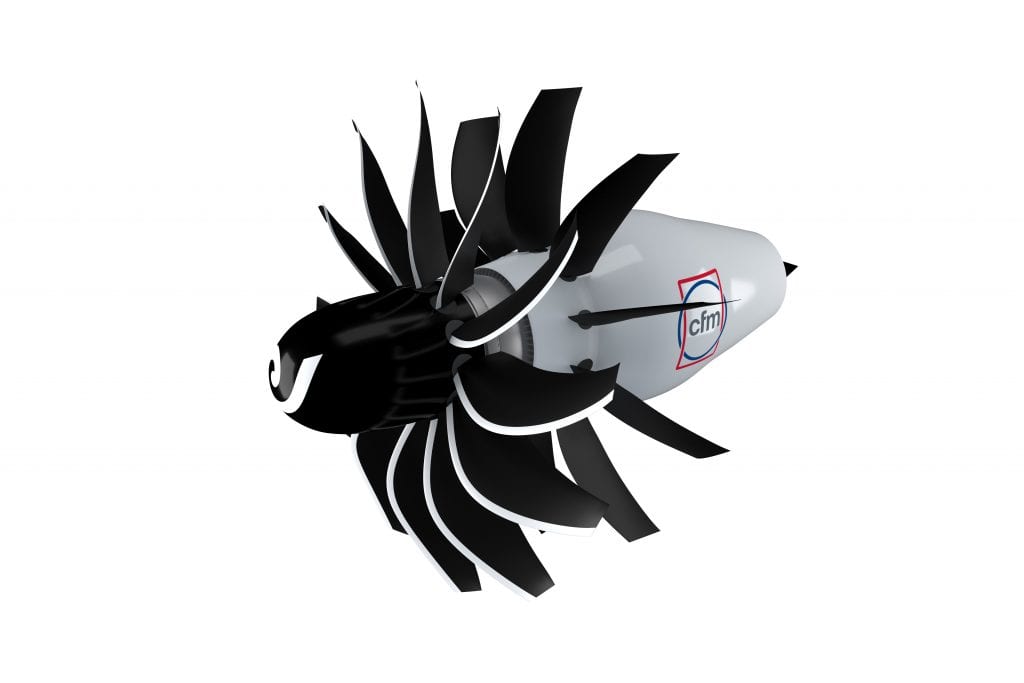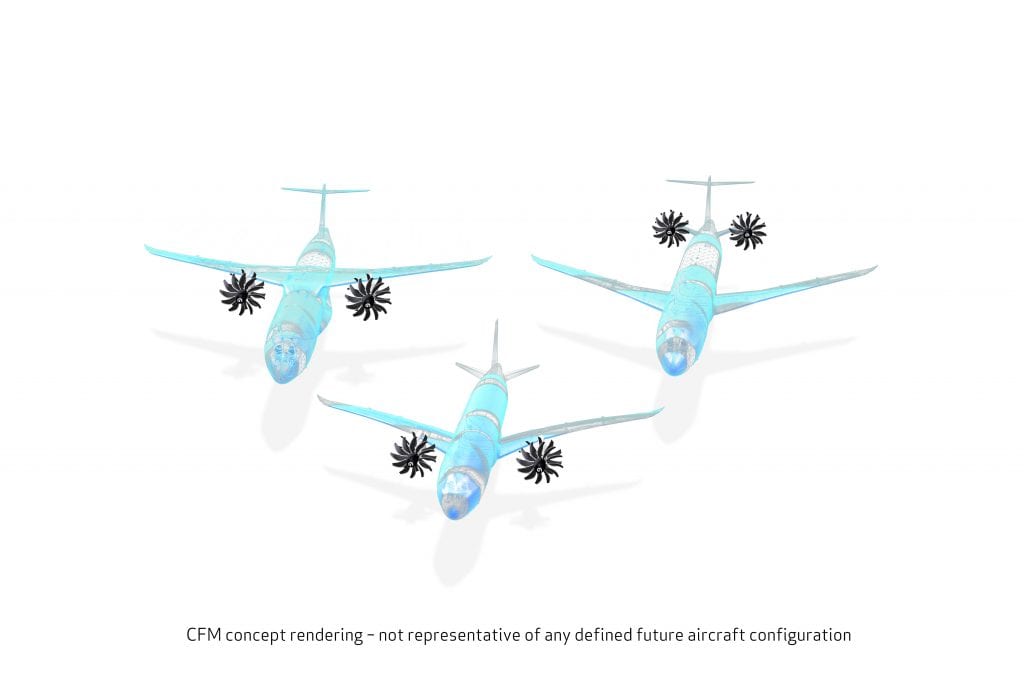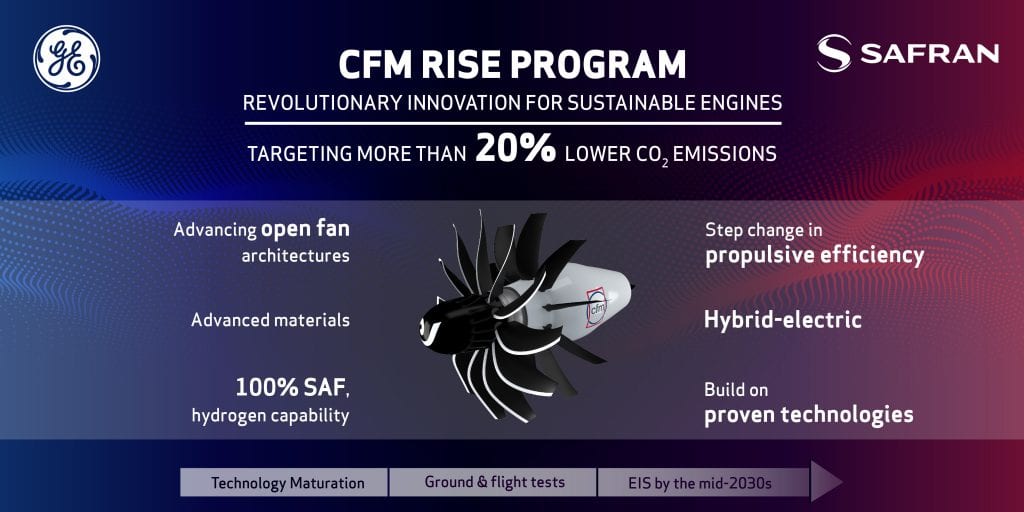
The CEOs of GE Aviation and Safran hosted a press conference on June 14 to announce the RISE program. (Safran)
GE Aviation and Safran launched a program to develop the next generation CFM engine with sustainability as a top goal. The two companies have partnered on a development program, RISE, which will test advanced technologies to create more sustainable engines with lowered emissions and higher efficiency.
“The aviation industry has been a leader in developing and embracing a global framework for cutting CO2 emissions,” John Slattery, President and CEO of GE Aviation, said during a June 14 press conference announcing the program. “Coordinated global action to limit the rise of global warming, it’s vital for our health of our planet and our shared communities. It’s innovation now that we need to meet this challenge and that’s our noble cause.”
RISE, which stands for revolutionary innovation for sustainable engines, began in 2019 and has a goal of lowering fuel consumption and CO2 emissions by 20 percent. It will also focus on the development of an engine that can run on 100 percent sustainable aviation fuel (SAF).
“Today, we are at a point of inflection,” Olivier Andriès, CEO of Safran, said. “As once distant commitments now drawn nearer, we must act with a burning sense of urgency. Our needs to earn the right to grow as an industry, we must rise to that challenge of decarbonization and meeting the industry’s commitments to half CO2 emissions by 2050, but that requires a vast collective effort. There’s no single technology or indeed company that can do this alone.”
The RISE program will explore the development of disruptive technologies like hydrogen and hybrid-electric propulsion. Arjan Hegeman, general manager of advanced technology operation at GE Aviation, said they will achieve the program’s goals by focusing on three key technology pillars: advanced architecture, advanced materials, and hybrid electrification.

The RISE program will develop an open fan architecture which will be key to achieving efficiency and sustainability targets. (Safran)
An example of one of these architectures is the open fan architecture, Delphine Dijoud, executive manager of CFM RISE Program – Systems Engineering, said.
“We are evaluating several promising architectures as part of our technology maturation plan,” Dijoud said. “The most ambitious, the one that will yield the greatest benefit, is the open fan architecture. For the open fan, our vast experience with carbon fiber composites is enabling us to achieve a larger diameter, optimizing aerodynamics and acoustics.”
Hegeman said the step change and propulsive efficiency achieved with this architecture is a significant step in lowering CO2 emissions and increasing efficiency.
Francois Bastin, vice president of commercial engines at Safran Aircraft Engines, said that the open fan engine will also provide many options for engine placement including the rear of the fuselage or under the wings with a high or low wing configuration.

The open fan architecture will offer flexibility for airframe integration. (Safran)
The program will also explore thermal efficiencies using next-generation materials with lower weight and higher temperature capabilities, Dijoud said.
“The advantage of this reduction is that it provides for both significant extended range, as well as becoming a key economic enabler for more sustainable and zero-emission fuels,” Hegeman said.
The RISE program will be the first to develop hybrid electric engine technology for a single-aisle aircraft, Hegeman said. The system being developed will not only provide electric thrust but also generate electricity for itself and the aircraft.
“By embedding a generator in the engine, we will bring flexibility to engine controls throughout the entire flight envelope,” Dijoud said. “Both GE and Safran have extensive experience and competencies in this field that will be brought to the CFM RISE program.”
Current aircraft engines are approved to run with a 50 percent blend of SAF. The RISE program is committed to developing engines that are 100 percent SAF compatible.
“This next-generation engine will be capable of being operated with 100 percent sustainable fuels including hydrogen,” Andriès said. “It’s important to say that 90 percent of the engine would remain the same whatever the fuel is, 90 percent of the engine. So, the hydrogen option is potentially compatible with our next-generation engine.”
The RISE program will begin testing engine modules and engines in the mid-2020s and then move to ground and flight testing, Mohamed Ali, vice president and general manager of engineering at GE Aviation, said. The engines developed from this program could enter service in the 2030s.
“We are actually super excited, I mean I’ll talk as an engineer here, this is nirvana, right,” Ali said. “We are super excited about not just embracing the challenge of sustainability…but I’m excited that we are developing a whole suite of technologies, each one of them is very challenging.”

The RISE program will develop technologies that will be used on GE and Safran’s next CFM engine. (Safran)
While this program will address multiple technology areas to lower emissions and increase efficiency, Andriès said it will not be enough to meet the industry’s emissions goals alone.
“Engine advances alone are not enough to meet the industry’s goals,” Andriès said. “One essential key to success will be the use of sustainable aviation fuels. Our disruptive engine will be able to run with 100 percent SAF and will also be compatible with liquid hydrogen. Today’s engines are certified to run with 50 percent, but currently, the industry is using only 0.1 percent sustainable fuel…It is important that the regulators drive the industry over this solution, which is technically accessible today. We cannot wait for 2045 in order to achieve significant CO2 emissions reduction.”
The two companies also announced that their CFM International 50/50 partnership would be extended until 2050.